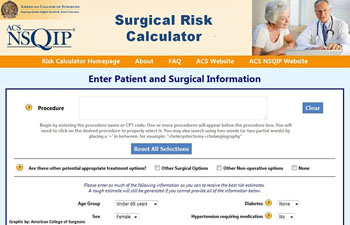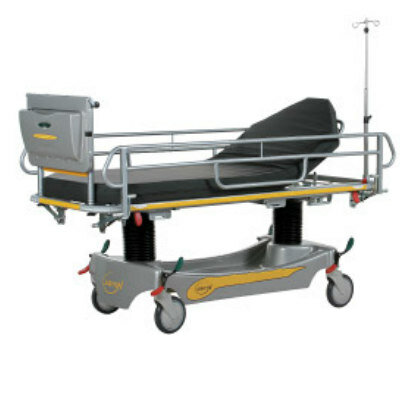Surgical Risk Calculator Results Proved Valid
|
By HospiMedica International staff writers Posted on 01 Jun 2016 |

Image: A screenshot from the Surgical Risk Calculator (Photo courtesy of the American College of Surgeons).
A web-based surgical risk decision aid and informed consent tool can accurately estimate the chance of a patient experiencing postoperative complications, claims a new study.
Researchers at the American College of Surgeons (ACS; Chicago, IL, USA) conducted a study to evaluate the ACS National Surgical Quality Improvement Program (ACS NSQIP) Surgical Risk Calculator calibration, as well as discrimination, for each of 11 outcomes modeled from nearly 3 million patients between 2010 and 2014. The researchers evaluated model performance for the development (60% of records), validation (20%), and test (20%) datasets.
Prediction equations from the development dataset were recalibrated using restricted cubic splines estimated from the validation dataset. The researchers then analyzed the calibration of the Surgical Risk Calculator between the predicted risk and actual outcomes on average, and across the spectrum of predicted risk--from low to high. The researchers also evaluated performance on data subsets composed of higher-risk operations.
The results showed that the non-recalibrated Surgical Risk Calculator performed well, but there was a slight tendency for predicted risk to be overestimated for lowest- and highest-risk patients, and underestimated for moderate-risk patients; after recalibration, the distortion was eliminated. Calibration was also excellent for higher-risk operations, though observed calibration was reduced due to instability associated with smaller sample sizes. The study was published in the June 2016 issue of the Journal of the American College of Surgeons.
“Our study demonstrates that the NSQIP Surgical Risk Calculator has excellent calibration,” said study co-author Mark Cohen, PhD, statistical manager in the ACS Division of Research and Optimal Patient Care. “Although no such tool can provide perfect predictions, the Surgical Risk Calculator does what it is intended to do--accurately estimate a patient's probabilities for important adverse events postoperatively.”
Created in 2013, the NSQIP surgical risk calculator is a web-based decision aid and informed consent tool widely used by surgeons and their patients to calculate the risk of potential postoperative complications. The database includes comparative risk for more than 1,500 different surgical procedures. It currently receives an estimated 1,500 hits a day.
Related Links:
American College of Surgeons
Researchers at the American College of Surgeons (ACS; Chicago, IL, USA) conducted a study to evaluate the ACS National Surgical Quality Improvement Program (ACS NSQIP) Surgical Risk Calculator calibration, as well as discrimination, for each of 11 outcomes modeled from nearly 3 million patients between 2010 and 2014. The researchers evaluated model performance for the development (60% of records), validation (20%), and test (20%) datasets.
Prediction equations from the development dataset were recalibrated using restricted cubic splines estimated from the validation dataset. The researchers then analyzed the calibration of the Surgical Risk Calculator between the predicted risk and actual outcomes on average, and across the spectrum of predicted risk--from low to high. The researchers also evaluated performance on data subsets composed of higher-risk operations.
The results showed that the non-recalibrated Surgical Risk Calculator performed well, but there was a slight tendency for predicted risk to be overestimated for lowest- and highest-risk patients, and underestimated for moderate-risk patients; after recalibration, the distortion was eliminated. Calibration was also excellent for higher-risk operations, though observed calibration was reduced due to instability associated with smaller sample sizes. The study was published in the June 2016 issue of the Journal of the American College of Surgeons.
“Our study demonstrates that the NSQIP Surgical Risk Calculator has excellent calibration,” said study co-author Mark Cohen, PhD, statistical manager in the ACS Division of Research and Optimal Patient Care. “Although no such tool can provide perfect predictions, the Surgical Risk Calculator does what it is intended to do--accurately estimate a patient's probabilities for important adverse events postoperatively.”
Created in 2013, the NSQIP surgical risk calculator is a web-based decision aid and informed consent tool widely used by surgeons and their patients to calculate the risk of potential postoperative complications. The database includes comparative risk for more than 1,500 different surgical procedures. It currently receives an estimated 1,500 hits a day.
Related Links:
American College of Surgeons
Latest Surgical Techniques News
- Pioneering Sutureless Coronary Bypass Technology to Eliminate Open-Chest Procedures
- Intravascular Imaging for Guiding Stent Implantation Ensures Safer Stenting Procedures
- World's First AI Surgical Guidance Platform Allows Surgeons to Measure Success in Real-Time
- AI-Generated Synthetic Scarred Hearts Aid Atrial Fibrillation Treatment
- New Class of Bioadhesives to Connect Human Tissues to Long-Term Medical Implants
- New Transcatheter Valve Found Safe and Effective for Treating Aortic Regurgitation
- Minimally Invasive Valve Repair Reduces Hospitalizations in Severe Tricuspid Regurgitation Patients
- Tiny Robotic Tools Powered by Magnetic Fields to Enable Minimally Invasive Brain Surgery
- Magnetic Tweezers Make Robotic Surgery Safer and More Precise
- AI-Powered Surgical Planning Tool Improves Pre-Op Planning
- Novel Sensing System Restores Missing Sense of Touch in Minimally Invasive Surgery
- Headset-Based AR Navigation System Improves EVD Placement
- Higher Electrode Density Improves Epilepsy Surgery by Pinpointing Where Seizures Begin
- Open-Source Tool Optimizes Placement of Visual Brain Implants
- Easy-To-Apply Gel Could Prevent Formation of Post-Surgical Abdominal Adhesions
- Groundbreaking Leadless Pacemaker to Prevent Invasive Surgeries for Children
Channels
Critical Care
view channel
Ingestible Smart Capsule for Chemical Sensing in the Gut Moves Closer to Market
Intestinal gases are associated with several health conditions, including colon cancer, irritable bowel syndrome, and inflammatory bowel disease, and they have the potential to serve as crucial biomarkers... Read moreNovel Cannula Delivery System Enables Targeted Delivery of Imaging Agents and Drugs
Multiphoton microscopy has become an invaluable tool in neuroscience, allowing researchers to observe brain activity in real time with high-resolution imaging. A crucial aspect of many multiphoton microscopy... Read more
Novel Intrabronchial Method Delivers Cell Therapies in Critically Ill Patients on External Lung Support
Until now, administering cell therapies to patients on extracorporeal membrane oxygenation (ECMO)—a life-support system typically used for severe lung failure—has been nearly impossible.... Read morePatient Care
view channel
Portable Biosensor Platform to Reduce Hospital-Acquired Infections
Approximately 4 million patients in the European Union acquire healthcare-associated infections (HAIs) or nosocomial infections each year, with around 37,000 deaths directly resulting from these infections,... Read moreFirst-Of-Its-Kind Portable Germicidal Light Technology Disinfects High-Touch Clinical Surfaces in Seconds
Reducing healthcare-acquired infections (HAIs) remains a pressing issue within global healthcare systems. In the United States alone, 1.7 million patients contract HAIs annually, leading to approximately... Read more
Surgical Capacity Optimization Solution Helps Hospitals Boost OR Utilization
An innovative solution has the capability to transform surgical capacity utilization by targeting the root cause of surgical block time inefficiencies. Fujitsu Limited’s (Tokyo, Japan) Surgical Capacity... Read more
Game-Changing Innovation in Surgical Instrument Sterilization Significantly Improves OR Throughput
A groundbreaking innovation enables hospitals to significantly improve instrument processing time and throughput in operating rooms (ORs) and sterile processing departments. Turbett Surgical, Inc.... Read moreHealth IT
view channel
Printable Molecule-Selective Nanoparticles Enable Mass Production of Wearable Biosensors
The future of medicine is likely to focus on the personalization of healthcare—understanding exactly what an individual requires and delivering the appropriate combination of nutrients, metabolites, and... Read more
Smartwatches Could Detect Congestive Heart Failure
Diagnosing congestive heart failure (CHF) typically requires expensive and time-consuming imaging techniques like echocardiography, also known as cardiac ultrasound. Previously, detecting CHF by analyzing... Read moreBusiness
view channel
Expanded Collaboration to Transform OR Technology Through AI and Automation
The expansion of an existing collaboration between three leading companies aims to develop artificial intelligence (AI)-driven solutions for smart operating rooms with sophisticated monitoring and automation.... Read more
















